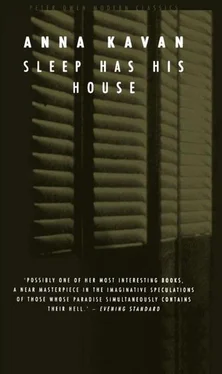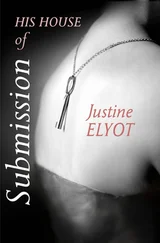The flowers and the birds between them, helped by the sun and the pleasant light breeze, have made a natural paradise which it is impossible to imagine as being invaded by anything evil or cruel or frightening or even sad. And to crown all this it must be a fête day as well. The low grey tower of the church, so old that it seems to have sunk into itself under the weight of the centuries, is now enlivened by the gaudy brightness of flags. Flags are fluttering over the vicarage and the manor and the school and the post office and out of the cottage windows.
The inn at the foot of the hill has other decorations besides the large flag the shadow of which dances over the grass outside. Wreaths and garlands of flowers, as well as fresh branches and coloured streamers, are fastened above and around the two open doors and the porch and the squat bow windows. Some agile person has even climbed up the pole of the inn sign and fastened a great loose bundle of honeysuckle to the iron scrolls supporting the board upon which a nameless rural artist has painted the likeness of some heraldic beast. The inn itself is a long low mellow building that seems to smile. And it’s quite right that it should have this smiling look because it’s the centre of all the gaiety, the headquarters, so to speak, of the message which the flowers and the birds have been spreading so diligently ever since the sun rose on this happy morning. Inside, a lively bustle of preparation is going on. Just now the doors set invitingly open don’t reveal much except high-backed settles and white sanded floors: but from time to time one catches a glimpse in the background of a figure hurrying past with a tray of good things, hams, cheeses, fruit, or a basket of crusty loaves hot from the oven, indications of the feast to be served later in the day.
At present all the activity centres out of doors, where a sort of impromptu pageant seems to be going on. Under the chestnut tree on the green a number of benches and tables have been set out, and here people are sitting with tankards of cider and ale, an audience for the panting, beaming maypole dancers with their whirling smocks and ribbons, and for the group of children who are singing a folksong in reedily cheerful disunison.
The black-coated clergyman, like an approving sheepdog, smiles at the innocent antics. And a party of local gentry also looks on from the platform festooned with meadowsweet and with white, pink and scarlet may.
To the left of the platform, among other young people, a girl in green shoes is holding a great dog on a leash plaited with vivid cords. It looks as if she and her companions, with whom she is laughing and talking, will have some part to play later on. They stand there together with faces of excited expectancy; and the dog seems to share their pleasure, as he flourishes his whiplike tail and prances in anticipation.
The children’s chorus falters unevenly to a close. Flushed and gasping, with a jingling of little bells at their ankles and wrists, the dancers laughingly troop away from the pole around which their variegated ribbons are left tightly twined. The audience claps, mugs are banged on the tables, a waitress in a check apron comes out carrying in both hands a huge foaming jug, the clergyman hurries here and there with directions and praise. For a minute or two the green is in confusion, before what must surely be the turn of the girl with the dog and her friends.
But she, all at once, at this critical moment becomes distrait. Her eyes wander. She is not looking any more at what’s taking place, but at something everyone else is too preoccupied to observe, a woman in black who is slowly coming towards the inn from the direction of the churchyard. Slowly but steadily the stranger comes on, unnoticed, and taking no notice of anything. She does not look right or left and her face is not seen. She walks as if meditating, with bowed head, and with hands loosely linked at the ends of her long black sleeves. In the sun a sapphire flashes blue on her finger: it is the only colour she wears anywhere about her. She slowly passes the green, making for the road that leads upwards into the hills
followed at a little distance by B, who lets the dog’s lead fall and, unobserved by her companions, slips away through the crowd, in the wake of that dark and impassive form.
Come, they said, the co-operators, the false ones. Come and sit with us tonight, we are having a friendly discussion (to fit the universe into pigeon-holes), quite informal of course, and a nice warm kiss, at sunrise, to finish the party. There will be a place waiting for you. And this sweet brew which contains soothing syrup is something to warm the cockles and to make you cosy. Let’s be cosy together. Draw the curtains. Make up the fire. Don’t look out of the window. Why do you want to look out? It’s dark and cold out there, so let’s settle down to be comfy and to discuss the shadow of Emerson’s Man.
Night time: a spirit of festivity is again in the air. And though it is not the idyllic Arcadian gaiety of the pastorale but something more sophisticated, more artificial, still there’s an atmosphere of expectancy and joyous excitement gleaming from the eyes of street lamps and lighted windows. In fact it is a city of lights, the whole dream is ablaze with light, the whole sky is one vast shimmering aurora borealis of reflected brilliance. It’s impossible to tell whether the stars are out or whether the moon is shining. All one sees in looking over the housetops is a diaphanous aerial curtain of wonderfully blended hues, red, orange, yellow, green, blue, indigo, violet, the whole spectrum extended and repeated from horizon to horizon like an endless series of rainbows in tremendous array. And on top of this, as if such a display wasn’t dazzling enough, over the glimmering folds of the resplendent light-curtain, strange wavering bands of pure white luminosity flicker and weave strands so incandescent that they appear to be glowing with limpid fire.
It’s really too much of a strain on the eyes, one can’t look upwards for long. Not that there is any contrasting dimness below. The streets are as bright as day, for the numerous street lights on normal duty are for this special night reinforced by countless additional flares, torches, links, blazing braziers, relics of ancient times which have perhaps been preserved and stored for the purpose of being resurrected on occasions of this sort. Nearly every window, too, seems to be pointing its burning finger into the night; for few people have thought of drawing the curtains.
At the palace a state ball is in full swing. The great building, with every window aflame, rides the night like an enormous ship, isolated as it is from the glaring streets in a dim sea of encircling gardens where only the fairy-lights show a pale luminous phosphorescence among the trees and the sleeping roses. It is tempting to linger in these cool shadowed walks drowsy with the heavy scent of night-stocks and tobacco flowers. Hidden away at the edge of a lily pool is an arbour where the glow-worm globe silvers the cheek of a gardenia and the folds of a lady’s gown. Accompanied by the faintest rustle of silk, a pair of lovers drifts past the little statue who holds up his cornucopia full of a pretty paleness of flowers or snow.
But here is the wide sweep, deserted now, where recently arriving guests thronged beneath tasselled awnings; where still the guards stand frozen in their grand uniforms, the powdered lackeys no less immobilized beyond.
There’s no need to describe the splendours of the palace; the statues, the winging staircases, the columns, the balustrades of marble and onyx and agate and porphyry. What’s the use of talking about the grandeur of the ballroom, the elegance of the dancers, the skill of the orchestra? Such things are better left to the imagination so that everyone can fill in for himself such details as he finds most satisfactory. Just as we can all picture the magnificent banquet overflowing with choicest wines, fruits, rare dishes of all descriptions, sanglier, sturgeon’s roe, peacocks stuffed with peaches, or whatever seems most delectable and exotic.
Читать дальше












